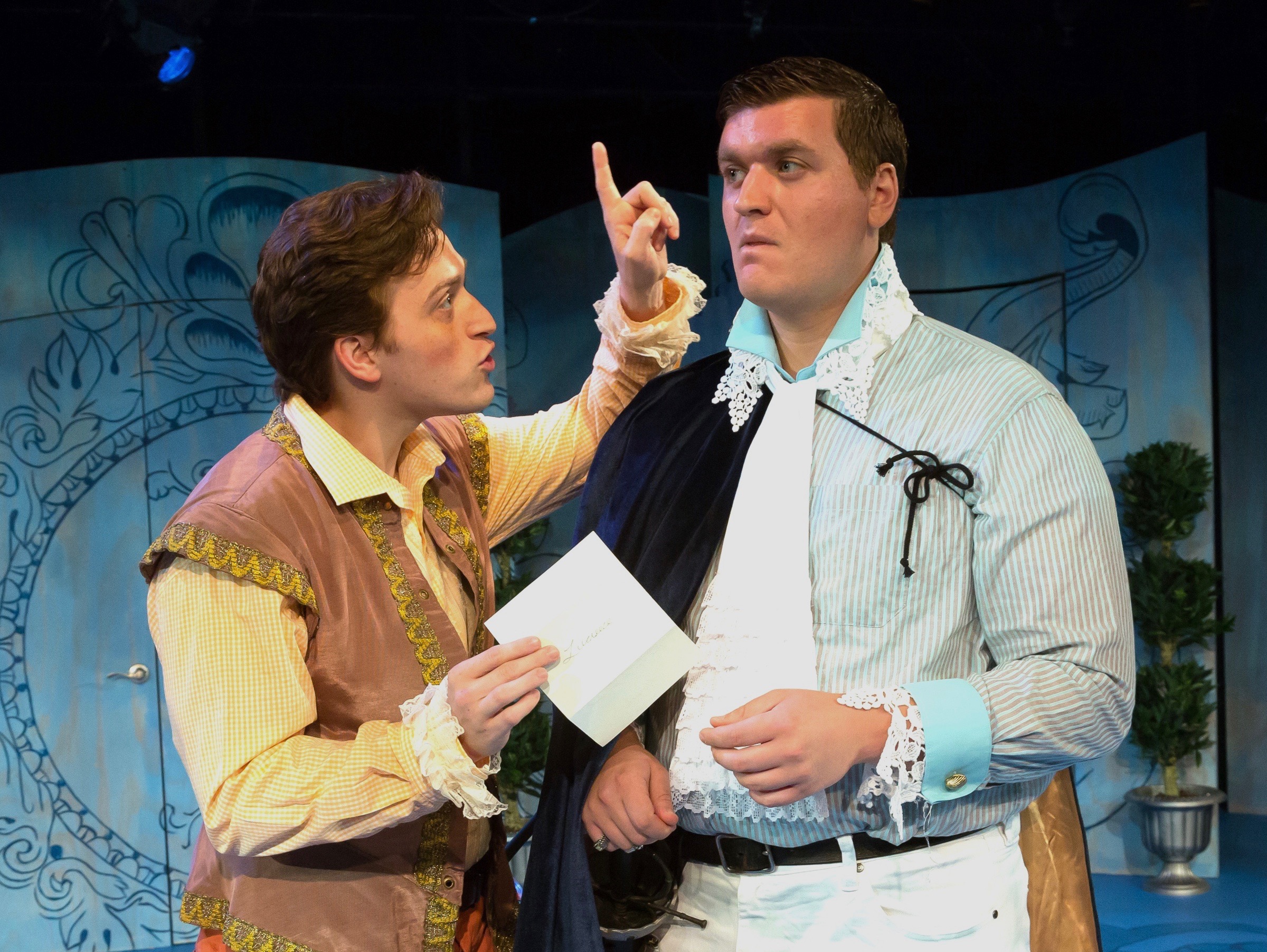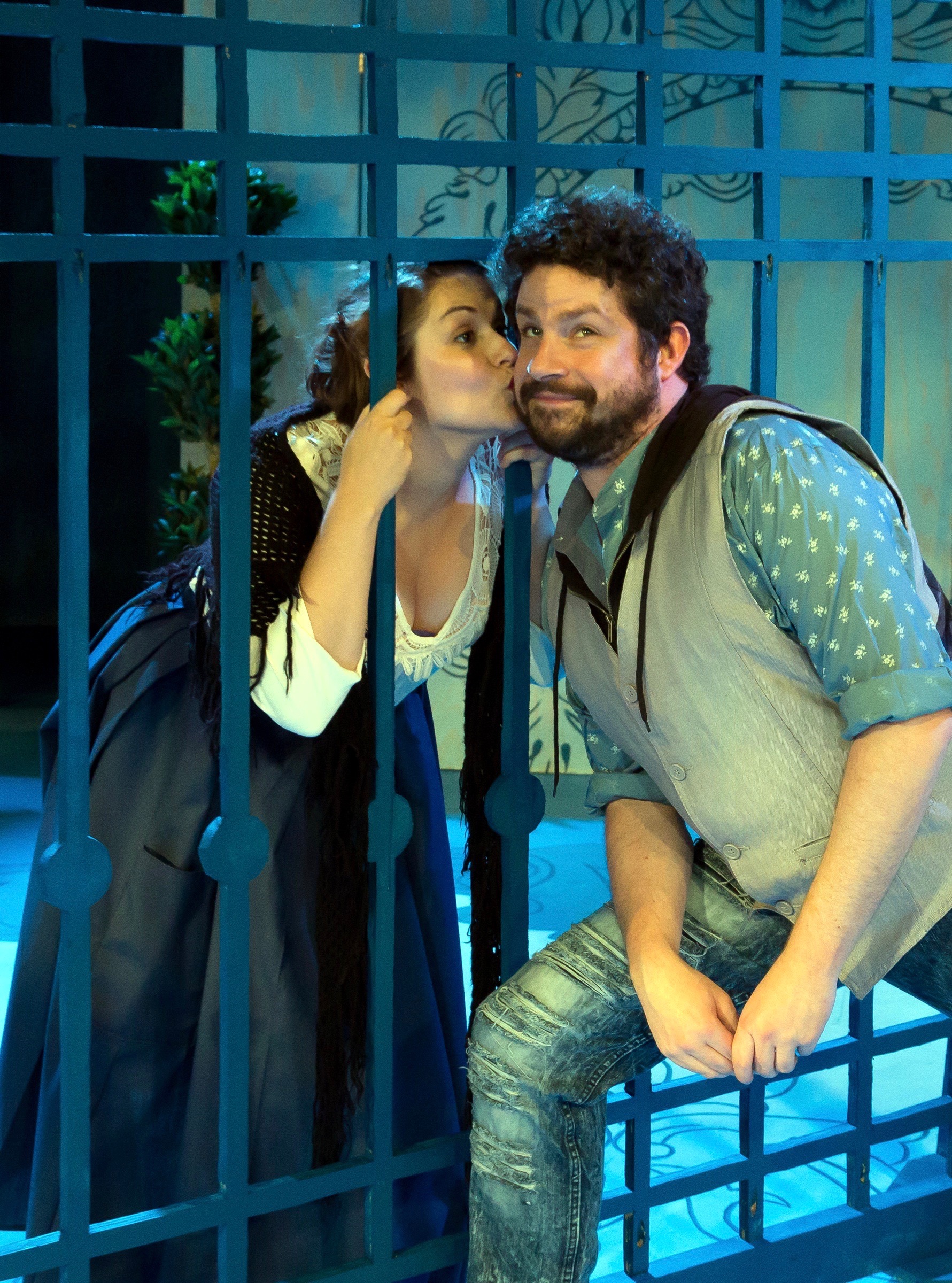No Lie: ‘The Liar’ Is Really Good

Bromance on the rocks: Dorante (Ethan Saks, L) is the liar who can explain everything, and he’d better, because Alcippe (Charlie Francis Murphy) has a sword and the muscle to wield it.
It is the policy of this reviewer never to call anything a must-see. There are already so many so-called must-sees that if people were to see them all, they wouldn’t have time to brush their teeth. And we don’t want the nation’s dental health to be as bad as its mental health.
But now comes the dilemma. Kinetic Theatre’s production of the David Ives play The Liar (through Sept. 30) is so good, and so funny, that if I were to say or even imply that it is NOT a must-see, I’d be LYING. And I can’t lie anywhere near as artfully as the title character, who makes our current crop of real-life liars look like amateurs.
So here is the truth. The world of arts and entertainment really does offer more good stuff than a person can hope to see. I recommend The Liar because it is good—and funny—in ways that are rarely seen. In fact it may be the oddest of odd ducks to strut and fret upon a Pittsburgh stage thus far this year: a play that may seem an unlikely candidate for Coolest Play of the Year, but in fact, it is.
A Hoary Remake? In VERSE?
The Liar is a modern remake of a 17th-century comedy of the same title by the French dramatist Pierre Corneille—and right away I can hear skeptics muttering, “Oh no, not for me, thanks.”
Many remakes of way-way-back theater comedies tend to fall into one of two black pits of non-entertainingness. Either they are faithful to the original, subjecting audiences to lots of blather that was state-of-the-art hilarity back then but isn’t today, or they try to juice up the old racehorse by shooting her so full of corny anachronism gags that she flops on her belly at the quarter-mile, neighing pitifully.
With The Liar, American playwright Ives has done neither. He walks the line. Ives has kept the setting of the play in Paris during the 1600s and most of Corneille’s plot. The story concerns a young blade, Dorante (played by Ethan Saks), who arrives in the city looking for, well, action.
Dorante is constitutionally incapable of telling the truth. And he doesn’t merely lie to cover up inconvenient realities, as run-of-the-mill liars do. He invents fantastic unrealities, telling elaborate tall tales about such matters as the war he didn’t fight in, and the awesome moonlight seduction he claims he conducted, lavishing pomegranates and other such aphrodisiacs upon the woman while musicians played an oboe serenade. Dorante’s motto, he says, is “The unimagined life is not worth living.”
He embellishes his stories with vivid details—“irrelevant details are the key” to successful lying, Dorante explains when asked to give a lesson in the art. And he brings the most implausible stories to life by acting them out with an inspired, wide-eyed energy that signifies I almost couldn’t believe it myself, but it’s true, it’s true! (Verily I say, actor Saks is a dancing dervish of deceit in these scenes, which must be seen to be, ahem, believed.)
Of course the stories cause trouble, and we’ll touch on some of that. But another thing Ives does is put the play’s language into modern colloquial English. The characters speak in idioms and expressions you’d hear on the streets of America today, and marvelously, this does not come across as anachronistic. It registers as a very effective equivalent of the hip, modern French that was probably current in Paris when Corneille’s original premiered in 1644.
And there’s one more touch—a touch that harks back to times of old while putting this new version of The Liar emphatically, and riotously, over the top. The entire play is spoken in verse. Specifically, in rhyming pentameter.
Hold the Spoon; Try This Rap Battle
Now I can hear legions of today’s theatergoers muttering, “A play in verse? Gag me with a 10-inch spoon.” But wait. Can you think of another, rather popular show today that’s in verse? Correct. Lin-Manuel Miranda’s Hamilton.
Granted, there are differences. Hamilton is in rap verse; it’s accompanied by music (The Liar isn’t); and the language of Hamilton is chanted rap-style or outright sung, whereas The Liar is delivered in natural tones and rhythms. The differences, however, are not as great as one might think. Let’s take a moment for a mini-rap battle comparing Hamilton’s use of verse to convey drama with The Liar’s use of it to convey humor.
Here is the famous opening passage of Hamilton, which introduces Alexander Hamilton while evoking his lowly birth and origins in the West Indies:
“How does a bastard, orphan, / son of a whore and a Scotsman / dropped in the middle of a forgotten / spot in the Caribbean / by providence, impoverished, in squalor, / grow up to be a hero and a scholar?”
Now for a comparable passage from The Liar. This is the saucy maid Isabelle (Julianne Avolio) introducing herself to a nice young man:
“My name is Isabelle, I’m twenty-eight. / Okay, I’m twenty-nine. I’m single, straight, / Catholic, but please don’t let that interfere. / I like Italian food and English beer, / stuffed animals, long walks, Chanel perfume. / Here’s my address and the key to my room.”

Isabelle (Julianne Avolio) wears her heart on her lips, and Cliton (Patrick Halley) is smitten.
There’s much, much more. The nice young man in question is Cliton (Patrick Halley), Dorante’s manservant, who has gotten the job by pitching himself as follows: “I don’t eat much; check my diameter. I cook, I clean, I speak pentameter.”
The absurd rhymes just keep coming, piled upon each other in a dizzying and often polysyllabic succession that can leave you gasping at first—for a couple of minutes, I worried that I wouldn’t be able to follow the darned thing—but which quickly become so infectious, you find yourself bopping right along and even thinking in silly rhyme. At intermission, I ran into a friend who told me she’d recently “had an epiphany,” and my first thought for a comeback was Dang, dang, what rhymes with “epiphany”?
Duplicity Multiplied; the Power of the Performance
Dorante’s lies get him in plenty of hot water. For instance, he tells the bogus seduction story to his buddy Alcippe (Charlie Francis Murphy), a formidably large fellow who happens to be in love with the woman Dorante says he seduced. This precipitates a duel, which calls for another outrageous piece of play-acting by Dorante to squiggle out of certain death at sword-point—and so it goes.
Moreover, the confusion sown by Dorante’s duplicity is multiplied by mistaken-identity plot twists. Dorante has the hots for a young blonde he’s seen on the boulevard, Clarice (Erika Strasburg), but he gets misinformed and thinks her name is Lucrece (Sarah Silk), who, in fact, is Clarice’s friend and a brunette bombshell. Lusty Isabelle has a ferociously straight-laced twin sister, Sabine (played by the same actress dodging in and out of scenes).
Add in Dorante’s long-suffering father, Geronte (Sam Tsoutsouvas), who is trying to match-make for his slippery son while Alcippe’s servant Philiste (John Michnya) has romantic designs of his own, and you’ve got a merry-go-round that could easily fly off its axis, scattering the trick ponies hither and yon.
Yet everything hangs together, thanks to the powerful, crystal-clear performances of the Kinetic Theatre cast. The women are oft deceived, but they’re no fools; they can storm with any hurricane you care to name. Ditto for Dad, and kudos to all concerned. Kinetic has quickly become a contender for the title of Hottest (or Coolest) New Theater Company in Pittsburgh.

Sharp-eyed Clarice (Erika Strasburg, L) and Lucrece (Sarah Silk) use spyware to monitor the dubious doings of Dorante.
Let me finish with a brief testament to the impact of this play. On the night I went, The Liar did not merely draw a standing O at the end. In closing scenes near the end—when the many confusions are finally sorted out and various pairs of characters fall dreamily into one another’s arms in a cavalcade of happy endings—the audience broke into spontaneous applause for each and every one.
In short, The Liar did more than leave ‘em laughing. It got people buying into the story to the point where they really cared about the characters. The Liar furthermore has some layers of deeper meaning that wink at you every now and then. Maybe not with the depth or weight of Hamlet, but it’s a comedy for cripes sake, and you couldn’t ask for a better one.
Closing Credits and Ticket Info
Ives’ The Liar is directed for Kinetic Theatre by Andrew Paul. The costume design by Kim Brown and scenic design by Gianni Downs are spot-on; everybody does a good job. Through Sept. 30 in the Henry Heymann Theatre in the Stephen Foster Memorial, 4301 Forbes Ave., Oakland. For show times and tickets visit Kinetic on the web.
Photos by Rocky Raco.
Mike Vargo, a Pittsburgh-based freelance writer, covers theater for Entertainment Central.
Share on Social Media
Follow Entertainment Central
Latest Stories
Sign up for the EC Newsletter







